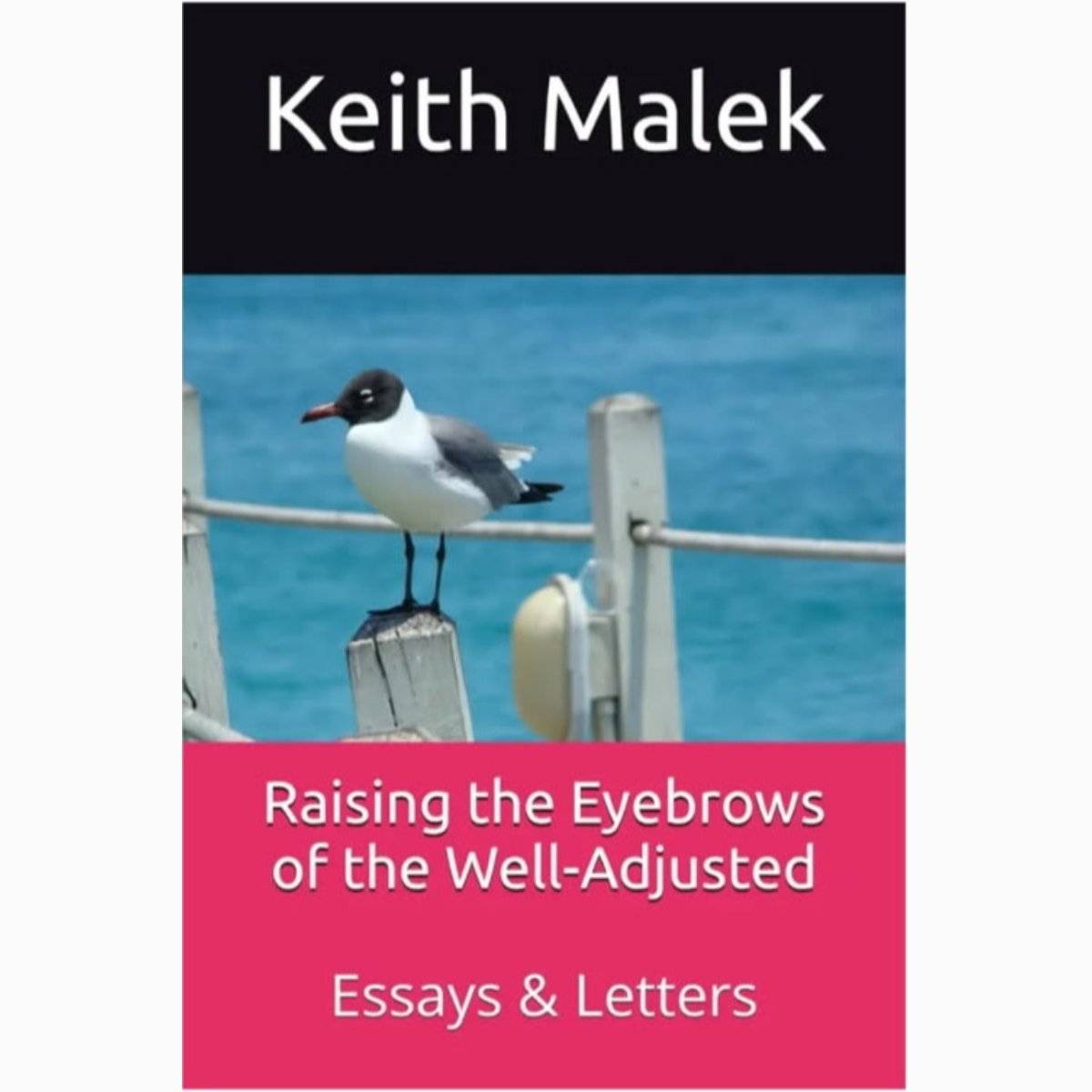DECEMBER 29
morganise (v.)-- To assassinate someone to prevent them from disclosing information

DECEMBER 29
morganise (v.)-- To assassinate someone to prevent them from disclosing information
Englishman Dave Gorman travels to America and attempts to drive coast to coast without financially supporting any type of chain, be it food, lodging or gas. This should have been more interesting than it was. In fact, it could have been interesting if it were an article rather than a book--a book that felt like it would never end.
#2025Book58
There's nothing more magical than New York in the snow. This morning, I'm alternating between flipping through these pages and looking out my window at “the real thing“ 😅(by the end of this storm, we're expecting eleven inches here in NYC).
#2025Book57
DECEMBER 26
crapulence (n.)-- A feeling of sickness caused by overeating or drinking
In American history, Paul Revere got the word out and helped win the war. If it had been Irish history, his horse would have been struck dead by lightning. 😂
DECEMBER 24
doniferous (adj.)-- Carrying a gift. Oblation (n.) is the act of giving or presenting a gift.
One day, I drew a sad face on a Post It note, wrote underneath it “Nature abhors me,“ and stuck it on the vacumn cleaner. Ever since I came up with that hilarious “nature abhors me“ idea, I leave my vacumn cleaner out in the open so that all my guests can see itand have a good laugh. Oddly enough, I don't seem to get many guests. I wonder why.
You should really be more careful with your ID. It has your address on it, and I shudder to think what could have happened if Bill Cosby had found it.
This is the book that you secretly don't like, but you don't want to admit that you don't like it because you feel bad for what happened to the author, and you appreciate the Herculean effort it took for him to write it. But it's okay--I'll be honest for you and disparage it for both of us. You're welcome.
#2025Book56
No matter what activity you're engaged in, whether it's barbecuing, miniature golf, gambling, storytelling, dancing, yodeling, arts and crafts, skydiving, trumpet playing, jogging, or driving an automobile, beer makes all of these activities more enjoyable. And come to think of it, blowjobs make all of those activities more pleasurable too, especially jogging, skydiving, mountain climbing, yodeling, and storytelling.
Aileen was clearly not understanding my point, and whenever people don't understand what I'm trying to tell them, for whatever reason, I tend to use metaphors that involve genocide. I wonder if there's medication for this.
We had been playing an outdoor concert in Milwaukee to a crowd of 45,000 people. We played a couple of songs, and the audience was already pretty charged up. But then we broke into the Kars 4 Kids jingle, and it was pure mayhem. I mean, they went fucking nuts. From the stage, we could see the crowd surge, but we didn't think it was anything to worry about. It wasn't until after the concert ended that we learned that three teenagers were killed.
I peaked in the fifth grade. I'm not proud of it, but facts don't cease to exist just because they're ignored.
DECEMBER 20
emption (n.)-- The act of purchasing something.
DECEMBER 18
bamblusterate (v.)-- To hoax, to confuse
DECEMBER 17
omnicide (n.)-- The destruction of everything.
This terrible book, like the plot itself, is an endurance test. Characters bicker at each other, occasionally stop walking, get shot. These three things are all that happens...over and over and over again, for what feels like an eternity. I googled the ending, and I don't feel like I missed out on ANYTHING by doing so.
DECEMBER 16
passade (n.)-- A short-lived romance
“Burning books is not the same as burning bodies, but when one intervenes...against mass destruction of churches and books one arrives just in time to prevent the burning of bodies.“ --Raphael Lemkin
Padraig has been in this country more years than he hasn't, but he's still Irish first, and like most Irish, he can tell you you're a useless piece of shit in a way that would make you say thanks and offer to pay for his dinner.
DECEMBER 15
scurryfunge (v.)-- To hastily tidy a house
DECEMBER 13
periplus (n.)-- A written account of a grand expedition or circumnavigation; an epic journey
DECEMBER 12
abbozzo (n.)-- A rough draft or preliminary sketch.
DECEMBER 8
saucerian (n.)-- A believer in flying saucers; an alien that travels by saucer-shaped craft.
DECEMBER 7
hooliness (n.)-- slowness, gentility; lateness, tardiness
DECEMBER 5
licitation (n.)-- To sell at auction; to sell to the highest bidder
As for Abraham, I don't think that he wants future success nearly as much as he wants the one thing that no one on this planet gets, and that's a do-over. He wants the success of “Kars 4 Kids,“ along with all the fame and the money and the women that came with it, minus the drug addiction and the poor choices.
December 4
premonstrance (n.)-- A portent, an omen.
To succeed, an attack would have to be both clever and quiet. “They must not be knocked down with bludgeons,“ Blaine brooded. “They must have their throats cut with a feather.“
Quiet is no certain pledge of permanence and safety. Trees may flourish and flowers may bloom upon the quiet mountain side, while silently the trickling raindrops are filling the deep cavern behind its rocky barriers, which, by and by, in a single moment, shall hurl to wild ruin its treacherous peace. --James Garfield
December 3
geoplanarian (n.)-- Someone who believes the earth is flat.
That's the thing about Keith Malek--you can love him or you can hate him, but you can never, ever ignore him. Malek holds up a mirror to ourselves, and when we see our reflections, we either dig deeper to unleash whatever talents we have, or we end up in a crackhouse on the outskirts of Brownsville. He is that powerful.
December 1
obstrigillation (n.)-- The action of opposing or resisting; an act of defiance.
I had just boarded the train and sat down when I saw your drivers license on the seat. I'm assuming that it fell out of your pocket, but I could be wrong. Maybe you like to travel to different states and intentionally leave your drivers license on a form of public transportation. That's fine too. It's not something that I would do, but to each his own. I'm not judging you, and like the old saying goes, “Don't knock it until you try it.“
“Watch. When we go back out there, the defendant will probably be in handcuffs,“ said Juror #2.
“Really?“ I asked. “What's he going to do if a spider crawls across his forehead? Do you think his attorney will brush it off for him, or do you think he'll just start smashing his head against the table? If he smashes his head on the table, the judge will probably think that he's flipping out again. What if a tarantula crawls on him?“
November 29
arctician (n.)--A polar animal; a polar explorer
November 27
exsibilation (n.)-- The hissing or jeering of a performer from the stage
“Aren't you the guy who....“ He paused, as if he wasn't sure that he should continue but then finished with, “works at the bodega?“ There was so much suspense for me in that pause that he could not possibly be aware of. That pause contained the possibility of validation. He could've asked, “Hey, aren't you the guy who was the frontman in the Kars4Kids band?“ He didn't do that though, cementing the reality that I'm nothing more than a has-been.
To think that just six months prior, we had been opening for The Wiggles. That was a boring gig, for sure, but at least we still maintained our childhood innocence. That innocence was shattered on October 25, 2013. That was the day we opened for Motley Crue in Las Vegas. By the end of that tour, the cops were looking to arrest all four of them, along with their manager, on child endangerment charges.
When I invented the printing press back in 1454, I had no idea that five-hundred-sixty-eight years later, Keith Malek would go on to write the masterpiece that you are currently holding in your hands. --From the foreword by Johannes Gutenberg
November 24
vandemonianism (v.)-- Rowdy, unmannerly behavior

My second book just came out. It's available on Amazon. It's Christmas time, so make sure to buy 50 copies for all of your friends and family. I'll also post a link in the comments section for my first book, Blonde Bombshell Fails to Detonate, which came out in 2022. It's almost universally regarded as the greatest book ever written. Buy 50 copies of that book as well. Thanks.
November 23
epistolisable (adj.)-- Worthy of writing in a letter
November 22
pseudandry (n.)-- The use of a male pseudonym by a female writer.
The Wodaabe are nomads of the Sahel, the rocky scrublands that signal the beginning of the Sahara. They have quite liberal sexual practices and an unsettling tendency to request sex of a woman by scratching her inner palm. The woman is expected to follow the scratcher then and there behind a bush --although, thankfully, the Wodaabe have great respect for women and typically accept rejection with a shrug.
November 19
archiloquy (n.)-- The opening of a speech
In an early-adopted eccentricity that would for him become a central “law of life,“ he refused to seek an appointment or promotion of any kind. “I suppose I am morbidly sensitive about any reference to my own achievements,“ he admitted. “I so much despise a man who blows his own horn, that I go to the other extreme.“
November 18
bibliopoesy (n.)-- The creation or publication of books